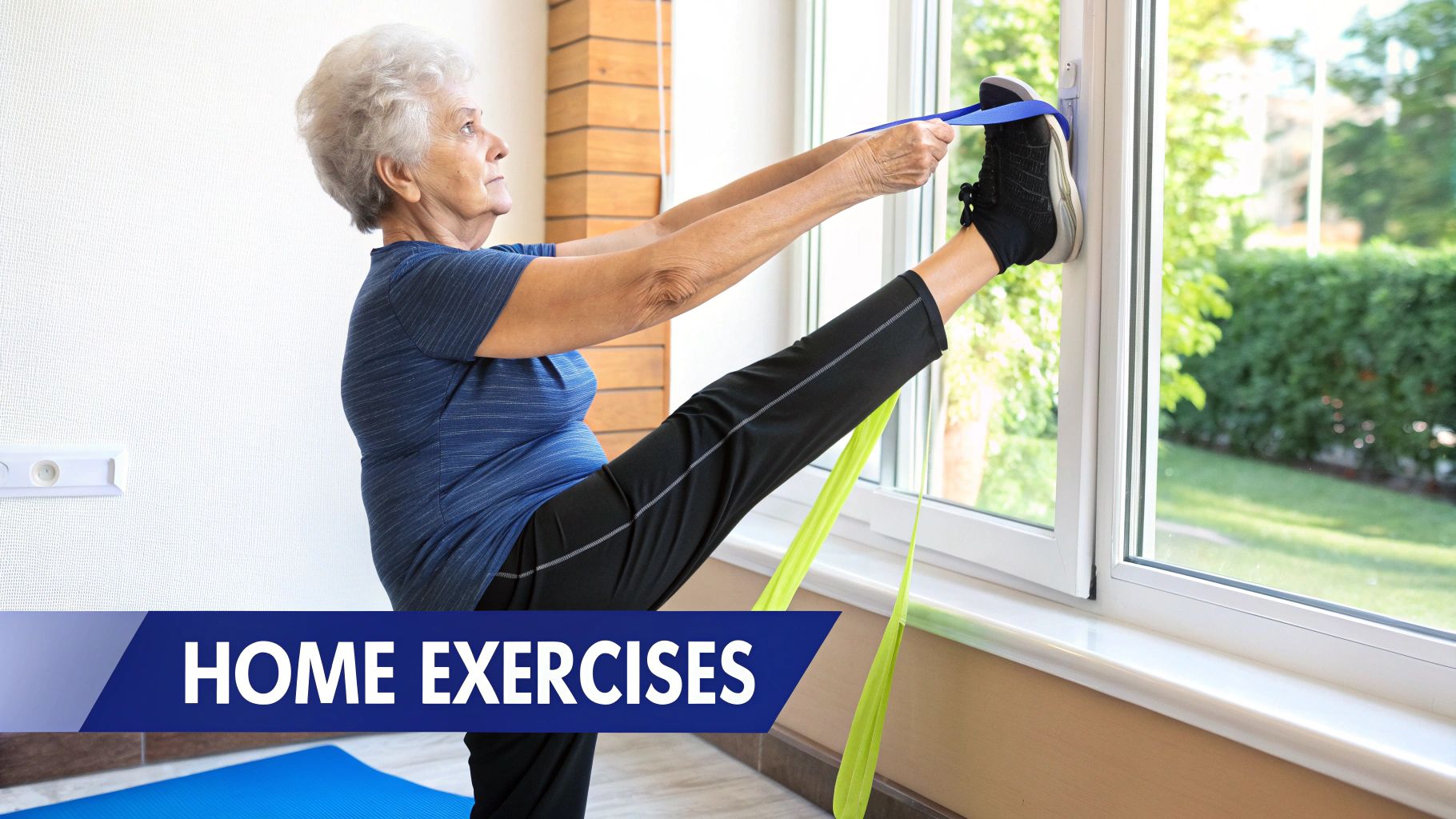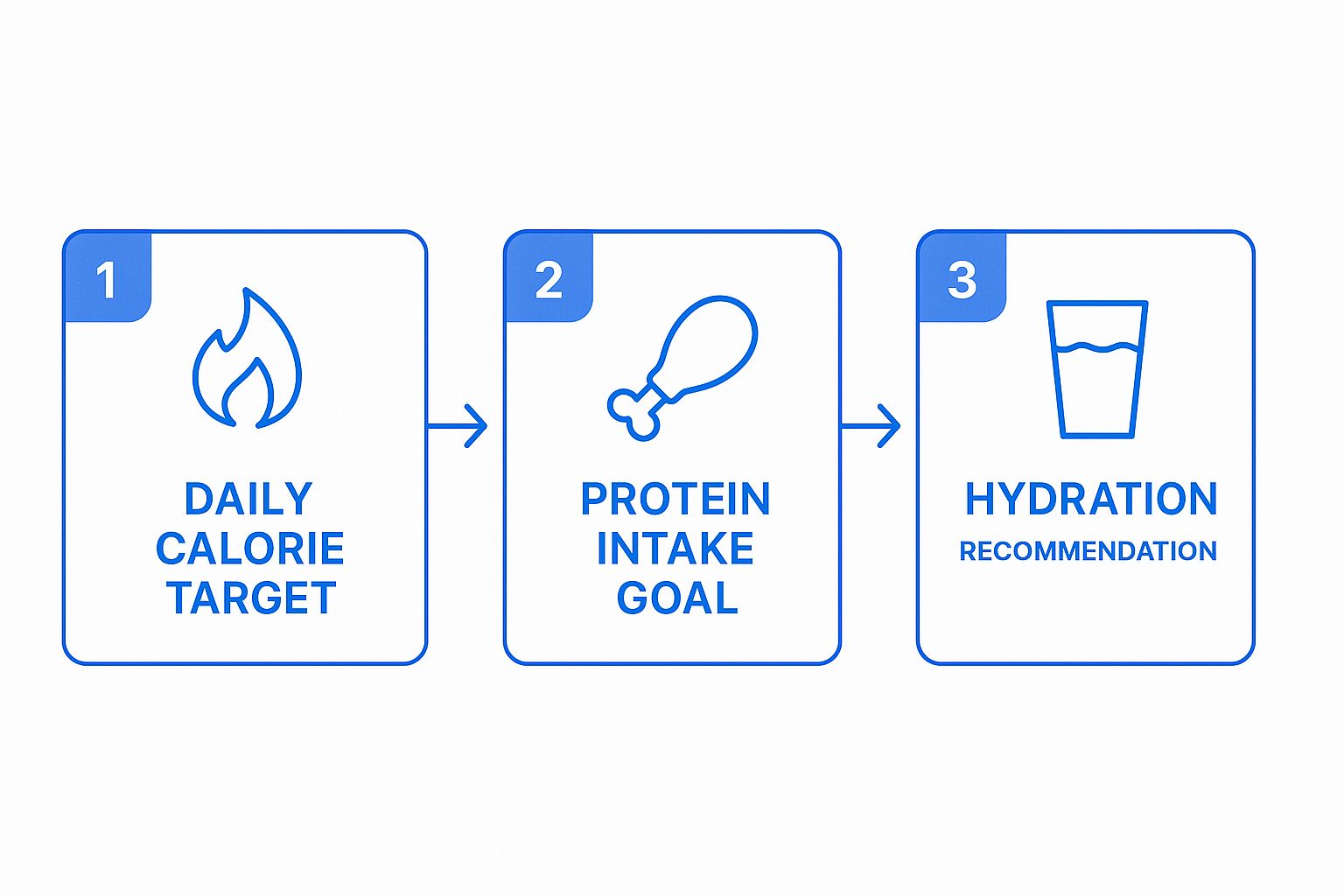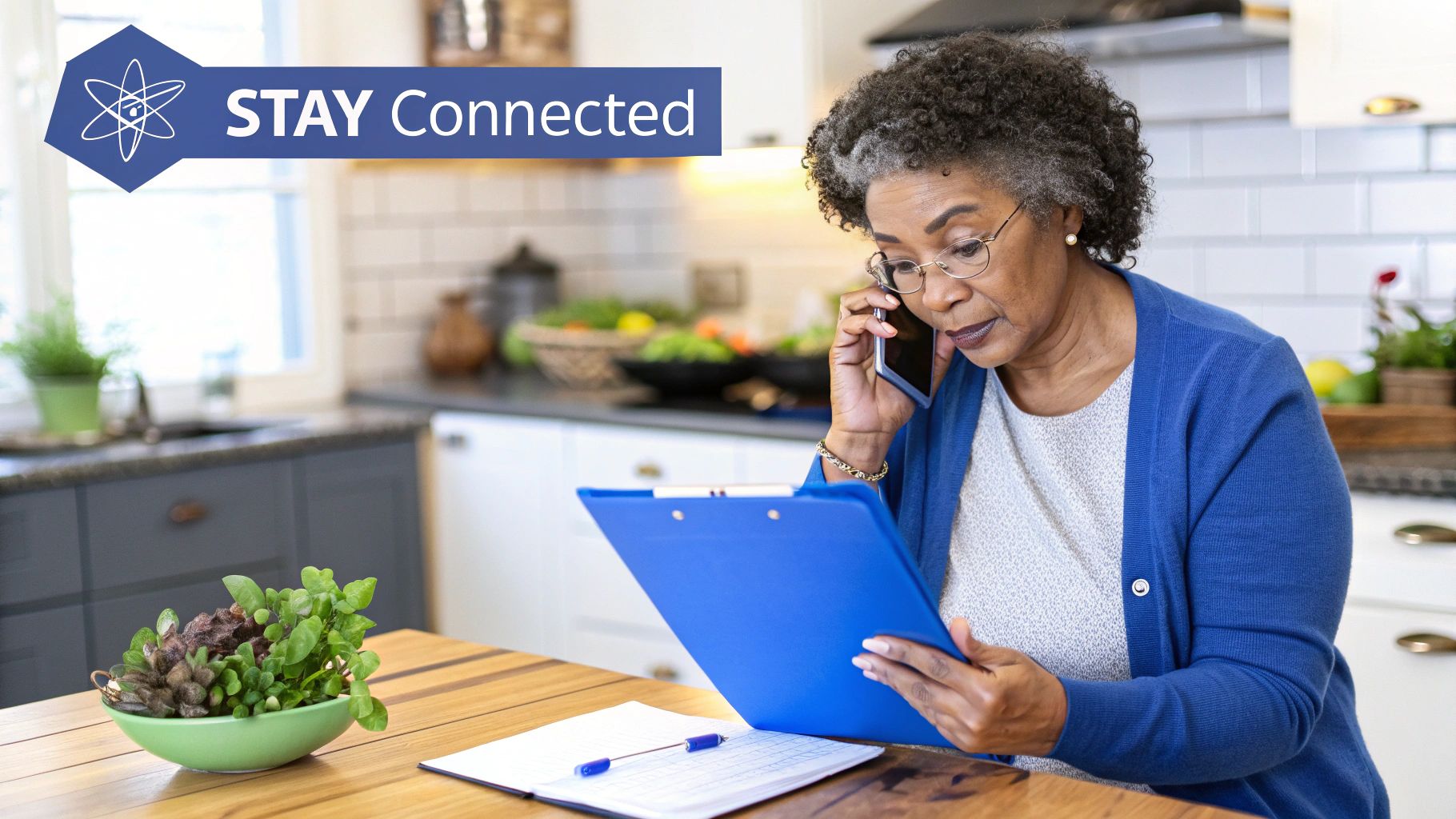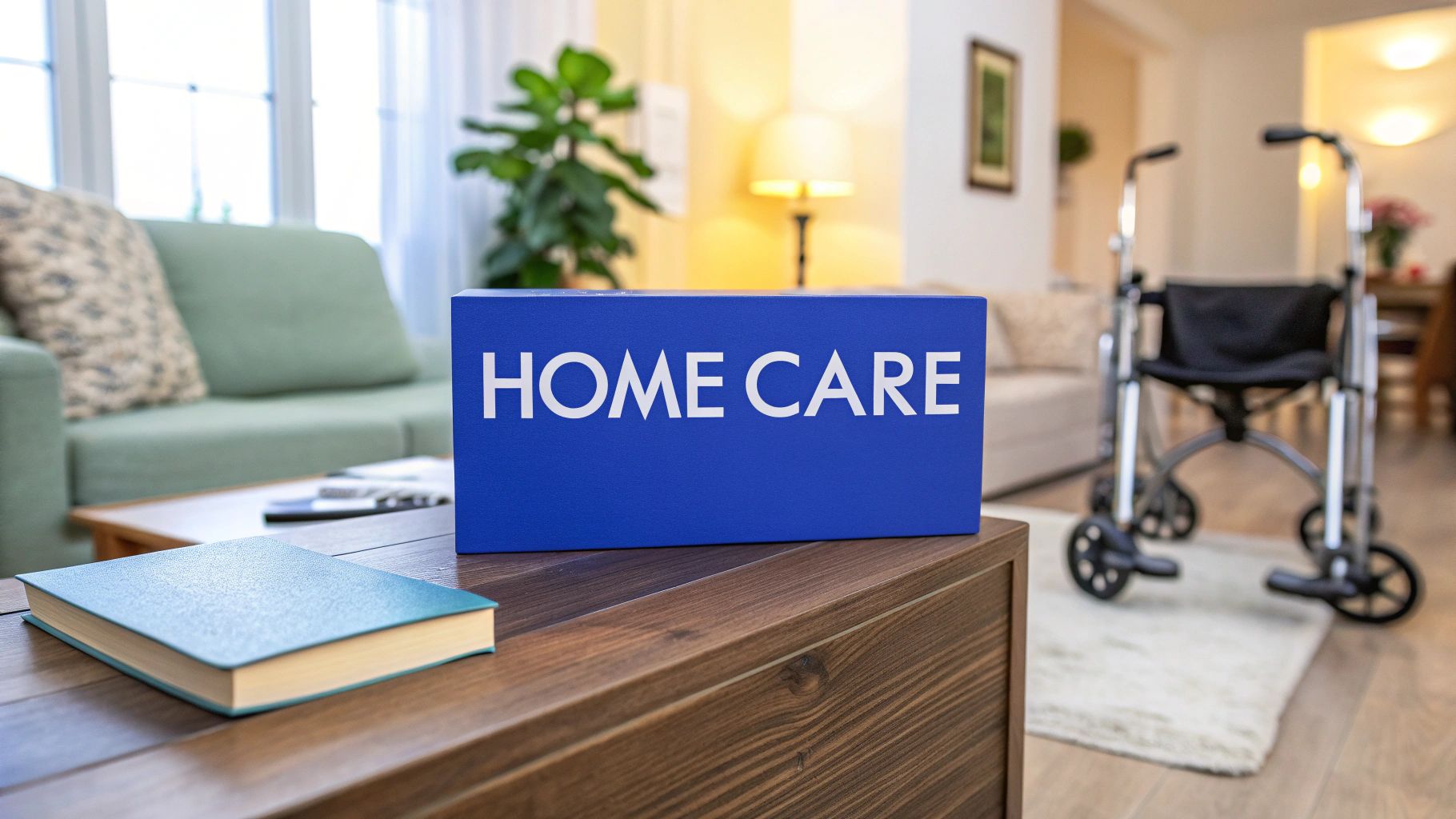The journey to successful home care after hospital discharge doesn't start when you walk through your front door. It begins the moment you start talking with the hospital staff—long before your loved one is actually sent home. This early planning is your golden opportunity to get the right information, ask the tough questions, and set the stage for a safe, smooth recovery.

Your First Steps in Post-Hospital Care
The time just before a hospital discharge can feel like a whirlwind. To cut through the chaos, your first move should be to connect with the hospital's discharge planner or case manager. Think of this person as your main point of contact, your guide for coordinating everything that comes next.
Your single most important goal here is to leave the hospital with a clear, written discharge plan. This isn't just a friendly suggestion; it's the essential roadmap for your loved one's recovery at home.
Key Conversations with the Discharge Planner
Don't go into this meeting empty-handed. Come prepared with a list of questions and don't hesitate to ask for more detail until you feel completely clear on the plan. I've seen too many families leave confused, and it causes problems down the line.
Here’s what you absolutely need to cover:
- Medication Management: Get a detailed list of every single medication, both new and old. You need to know dosages, schedules, and any potential side effects. A critical question to ask is, "Who is responsible for calling in these prescriptions to our pharmacy?"
- Mobility and Safety: Be clear on any new physical limits. Will they need a walker, a hospital bed, or a shower chair? Ask for direct referrals for physical or occupational therapy if needed.
- Dietary Needs: Are there new food restrictions? For instance, someone with congestive heart failure will likely need a low-sodium diet. You need specific, written guidelines to follow.
- Wound Care: If there are stitches, staples, or open wounds, you need to understand the care instructions perfectly. Find out who is supposed to do it—a visiting nurse, or a family member who needs training?
Being proactive here prevents dangerous mix-ups in those first crucial days back home. Leaving without this clarity can easily lead to medication errors or an unsafe environment, which is a fast track to being readmitted to the hospital.
The entire healthcare system is recognizing how powerful recovery at home can be. This isn't a small trend. Projections show that by 2025, up to $265 billion in care services for Medicare patients could shift from facilities to home settings. It's a huge move driven by what patients want and what works best clinically. You can learn more about this major healthcare shift from McKinsey.
Your Pre-Discharge Document Checklist
Before you even think about walking out of that hospital room, make sure you have physical or digital copies of all the essential paperwork. Do one last check to confirm you have it all.
Make sure your folder includes:
- The Official Discharge Summary
- A Complete, Up-to-Date Medication List
- The Schedule for All Follow-up Appointments
- Contact Information for the Main Doctor and Any Specialists
- Referrals for Home Health Agencies or Therapists
Having these documents organized and ready to go is the real first step to successfully managing home care after hospital discharge. It gives you the power to coordinate effectively with doctors, therapists, and caregivers from day one.
Choosing the Right Home Care Agency for Your Family
Picking the right home care provider after a hospital stay is one of the most important decisions your family will make. This isn't just about hiring a service; it’s about inviting a trusted partner into your home to ensure your loved one's safety, comfort, and recovery. It’s a choice that has a real, immediate impact on their well-being.
Before you even start calling agencies, you need to know exactly what kind of help is required. Your hospital discharge plan should be your guide here. Home care isn't a one-size-fits-all solution, and understanding the difference between skilled care and personal care is critical.
- Skilled Nursing Care: This is clinical-level support that must be delivered by a licensed nurse (an RN or LPN). Think tasks like wound dressing, managing IV medications, giving injections, or closely monitoring vital signs.
- Personal Care Aides (PCAs): These caregivers are the hands-on support for what we call Activities of Daily Living (ADLs). This includes help with bathing and dressing, preparing meals, light housekeeping, and simply being a companion.
Many times, a patient needs a blend of both. For instance, your father might need a nurse to pop in a few times a week for wound care, but a personal care aide daily to help him move around the house safely and make sure he’s eating properly.
Essential Questions for Vetting an Agency
Once you know the level of care you're looking for, it's time to interview agencies. And you should absolutely treat it like an interview—because that’s exactly what it is. You're hiring a company to care for someone you love. Don't be timid about asking direct, specific questions.
A good agency will welcome your diligence and answer transparently. If you get defensive or vague replies, that’s a huge red flag. I once worked with a family whose agency couldn't give a straight answer about its emergency backup plan. Sure enough, the caregiver got a flat tire one morning, and the family was left scrambling with no one to help. That’s simply not acceptable.
A common myth is that home health is the go-to option after a hospital stay. But research on Medicare beneficiaries tells a different story. Both traditional Medicare and Medicare Advantage patients actually use skilled nursing facilities (SNFs) more often. For Medicare Advantage, 19% went to SNFs versus 13% who used home health, with similar trends for traditional Medicare.
Key Areas to Investigate
A structured approach to your vetting process will make sure you don't overlook something crucial. You can see our own commitment to quality and professionalism in our team's high standards. This is the level of detail you should expect from any provider.
I highly recommend using a checklist to keep your thoughts organized and compare providers apples-to-apples. This helps you focus your questions on the most important areas.
Here is a checklist of questions I always recommend families use when they're interviewing potential agencies. It covers the core areas that truly separate a great provider from a mediocre one.
Home Care Agency Vetting Checklist
| Vetting Category | Key Questions to Ask | Why It Matters |
|---|---|---|
| Licensing & Insurance | Are you licensed by the state? Are you bonded and insured? Can you provide proof of liability insurance? | This protects you and your family from any liability if a caregiver is injured on your property. It’s non-negotiable. |
| Caregiver Screening | What does your screening process include? Do you do national criminal background checks, drug testing, and reference checks? | You are inviting a stranger into your home. Rigorous screening ensures the caregiver is trustworthy, reliable, and safe. |
| Training & Supervision | What initial and ongoing training do your caregivers receive? Is there a nurse supervisor who oversees the care plan? How often do they make supervisory visits? | Proper training and clinical oversight ensure care quality is consistently high and that the care plan adapts as needs change. |
| Emergency Protocols | What is your backup plan if a caregiver calls out sick or has an emergency? How quickly can you provide a replacement? | Life happens. A professional agency will have a robust system to ensure care is never interrupted, providing you with peace of mind. |
| Care Planning | How do you create the initial care plan? Who is involved in that process? How often is the plan reviewed and updated? | A personalized care plan tailored to your loved one's specific needs—and updated regularly—is the foundation of effective care. |
After you've done your interviews, take a moment to reflect. This decision isn't just about ticking boxes on a checklist. It's about finding a reliable partner. A great agency provides more than just a person; they offer a complete support system that guarantees continuity of care, safety, and genuine peace of mind for your whole family.
Getting the Home Ready for a Safe Recovery

Turning a familiar home into a safe harbor for healing is one of the most practical and powerful things you can do to support home care after hospital discharge. This isn't just about tidying up. It's about strategically removing obstacles and creating an environment that prevents accidents and fosters independence.
Simply put, a safe space means a faster, smoother recovery.
Take a walk through the home with a fresh, critical eye. Try to see it from the perspective of someone with limited mobility, poor balance, or fatigue. You'll be surprised how many small changes can make a massive difference in preventing falls—a leading cause of frustrating and dangerous trips back to the hospital.
A Room-By-Room Safety Sweep
Your primary goal is to create clear, uncluttered pathways. Pay special attention to the rooms your loved one will use the most: the bedroom, bathroom, and main living area. A simple checklist can keep you on track.
- Tackle trip hazards. This is non-negotiable. Secure loose area rugs with double-sided tape, or better yet, remove them completely for the time being. Get extension cords and charging cables tucked away and out of all walkways.
- Light the way. Good lighting is crucial, especially at night. Plug in nightlights in hallways, the bedroom, and the bathroom. Make sure lamps are within easy reach of the bed and their favorite chair.
- Secure the bathroom. The bathroom is a high-risk zone for falls. A sturdy shower chair, professionally installed grab bars, and a non-slip bathmat aren't just suggestions—they are essential pieces of safety equipment.
"A well-prepared home is the unsung hero of post-hospital recovery. By anticipating needs and removing hazards, families can create an environment that not only ensures physical safety but also provides immense psychological comfort, which is crucial for healing."
Getting the Right Medical Equipment
The hospital's discharge plan will likely recommend specific medical equipment, sometimes called durable medical equipment (DME). This might include a hospital bed, a walker, or a bedside commode. Seeing this list can feel overwhelming, but don't panic. Your home care agency can be a huge help here, often coordinating the rental or purchase for you.
When the equipment arrives, think logically about placement. A walker needs to be right next to the bed, ready for that first step in the morning. A shower chair should be set up before your loved one even thinks about their first bath at home. This level of detailed preparation is exactly how our NJ Caregiving team approaches client support.
Organizing for a Smoother Routine
An organized space reduces stress for both the person recovering and the caregiver. It's that simple. Designate one specific spot—a small table or a cleared-off section of a counter—to be the dedicated medication station. A pill organizer is a lifesaver for keeping a complex schedule straight.
This focus on home preparation is more important than ever. The desire to age in place is a powerful trend, with nearly 90% of users preferring to receive care in their own homes. With about 12 million people in the U.S. receiving home health services each year, setting the home up for success is absolutely key to meeting patient needs and improving outcomes.
Managing the Critical First 72 Hours at Home
The first three days home from the hospital are a make-or-break period for recovery. This is what we in the field often call the transition zone. It’s when new routines get set, your loved one is at their most vulnerable, and all the planning you did beforehand really gets put to the test. The goal isn't to be perfect; it's to create a sense of stability and safety.
Your main job is to establish a simple, repeatable daily rhythm. This single step does wonders for reducing anxiety for everyone. Think of it as building a temporary new normal. Instead of trying to do everything at once, break the day into manageable chunks centered around key activities: medication times, meals, rest periods, and any physical therapy exercises they were sent home with.
A calm, predictable schedule can honestly transform what feels like chaos into a structured, healing experience.
Sticking to the Medication Schedule
Getting the medication schedule right is probably the single most important task in these first 72 hours. One mistake here can lead to a serious complication or, worse, a trip right back to the hospital. A good pill organizer isn't just a suggestion; it's a non-negotiable tool for managing home care after hospital discharge.
Before that first dose is even due, sit down with the discharge paperwork and the organizer. Fill it up for at least the first full week. This simple action cuts through the confusion and makes sure the right pills are given at the right time. As a backup, set alarms on your phone for every single dose.
It's a common myth that home health is the go-to for everyone after the hospital. The data shows a different story. For Medicare beneficiaries, skilled nursing facilities (SNFs) are often more common. In fact, for Medicare Advantage members, 19% use SNFs while only 13% use home health. It just goes to show how many different paths recovery can take.
Making the First Home Health Visit a Success
That first visit from the home health nurse or aide is a crucial handoff. This is your moment to pass on all the vital information you absorbed from the hospital team. You’ll want to be prepared when they walk through the door.
Have these items ready and in one easy-to-find spot:
- The hospital discharge summary
- A complete, up-to-date list of all medications
- Contact information for all doctors and specialists
- Any questions you’ve thought of since getting home
Walk the caregiver through the daily routine you've started. Show them where you keep supplies, explain any of your loved one’s personal preferences, and be crystal clear about the goals outlined in the discharge plan. Starting things off collaboratively builds a strong foundation for the entire care partnership.

Watching for Early Warning Signs
During these first few days, you are the eyes and ears on the ground—the first line of defense. Knowing what to look for can stop a small issue from snowballing into a major medical problem.
Keep an eye out for these key warning signs:
- Fever: Any temperature reading over 100.4°F (38°C) could signal an infection.
- Increased Pain: Pay attention to pain that isn't being controlled by the prescribed medication.
- Breathing Issues: Any new shortness of breath or trouble breathing is a red flag.
- Changes in Wounds: Look for more redness, swelling, or any new drainage from an incision site.
- Confusion: Note any sudden shift in mental state or increased confusion.
Always trust your gut. If something just feels off, it probably is. Don't ever hesitate to call the doctor's office or the home care agency's on-call nurse for guidance. It's always, always better to be overly cautious. A quick phone call might just provide reassurance, or it could catch a problem early—which is what successful home care after hospital discharge is all about.
Coordinating Ongoing Care and Follow-Up Appointments

Once the initial rush of coming home from the hospital quiets down, the real work begins. The journey to a full recovery isn't a sprint; it's a marathon. Now, the focus shifts from managing the immediate crisis to building a care routine that can go the distance. Successfully navigating home care after hospital discharge is all about mastering the art of coordination.
This phase is all about consistency. It involves juggling a schedule packed with follow-up appointments—doctors, specialists, therapists—while making sure everyone on the care team is on the same page. A simple shared digital calendar or even a large, easy-to-read wall calendar can quickly become your mission control.
Creating a System for Follow-Up Visits
Don't just scribble down the appointment time and date. Before every visit, take a few minutes to create a small prep sheet. Jot down any new symptoms, changes you've noticed, and specific questions you need answered. This simple step turns a routine check-up into a genuinely productive conversation about your loved one's progress.
Think about it this way: the home care aide sees your loved one every day, you see them constantly, but the doctor only gets a 15-minute window every few weeks. Keeping a running log of observations is the only way to give that doctor the full picture.
For instance, tracking fluid intake for someone with heart failure is a game-changer. An aide can log the exact ounces consumed each day. When you can present that hard data to the cardiologist, it's infinitely more helpful than just saying, "I think he's drinking enough." You can see how our team at NJ Caregiving uses detailed tracking by exploring our approach to client care.
The impact of consistent, professional home visits is undeniable. Research shows that patients who receive two or more home visits after leaving the hospital have a significantly lower readmission rate—around 24%—compared to 36% for those without such follow-up. This underscores how crucial ongoing, in-person support is for a stable recovery.
Keeping the Entire Care Team Synchronized
Strong communication is what prevents dangerous gaps in care. The home health aide, the physical therapist, the primary doctor, and the family are all part of one team with a single goal. I always recommend establishing a central communication log—a simple notebook works perfectly—where every team member can leave quick notes after their visit.
This shared log might look something like this:
- Physical Therapist: "Patient walked to the mailbox and back with minimal assistance. Balance is improving."
- Home Care Aide: "Refused lunch today but drank all fluids. Seemed more fatigued than usual."
- Family Member: "Noticed slight swelling in the left ankle this evening."
This creates a live, real-time record of progress and flags potential setbacks before they become major problems. This is especially vital because studies have found that single follow-up calls don't do much to reduce readmission risks. It's the consistent pattern of multiple interactions that truly makes a difference.
This kind of proactive strategy shifts the whole dynamic. You're no longer just reacting to problems; you're in control, building a solid foundation for lasting health and well-being.
Of course. Here is the rewritten section, crafted to sound like it was written by an experienced human expert, following all the provided guidelines.
Your Top Questions About Post-Hospital Home Care
Stepping out of the hospital and into the world of home care can feel like you’re suddenly trying to learn a new language. It’s completely normal to have a ton of questions. The paperwork, the new faces, the costs—it can all be a lot to take in when you're already focused on recovery.
We've been through this with countless families. Let's walk through some of the most common questions we hear, breaking them down into simple, clear answers so you can feel confident and prepared.
How Do We Pay for Home Health Care?
This is often the first and biggest question on everyone's mind. The good news is you have options, but each one has its own set of rules, and it pays to understand them upfront.
- Medicare: Parts A and B can cover home health services, but it's not automatic. The key requirements are that a doctor must certify the patient as homebound and in need of skilled care, like nursing or physical therapy. It's designed for short-term, medical recovery, not long-term assistance.
- Medicaid: This is a major source of funding for home care, but eligibility and the specific services covered can vary wildly from one state to another. You'll need to check your state's specific Medicaid program for details.
- Private Insurance: Many private health plans offer some level of home care benefits. The best thing to do is pull out your policy or call your insurance provider directly. You need to ask specific questions about coverage for skilled nursing versus personal care aides.
- Other Avenues: Don't forget to look into other potential resources. Veterans Affairs (VA) benefits are a fantastic resource for eligible vets, and long-term care insurance policies are designed for exactly this kind of need. Of course, paying privately is also an option.
Getting a handle on payment early in the process will save you a world of financial stress later on.
A lot of people assume home health care is the go-to choice after a hospital stay, but the data tells a different story. Looking at Medicare beneficiaries, skilled nursing facilities (SNFs) are often the more common path. For instance, among Medicare Advantage members, 19% are discharged to an SNF, compared to just 13% who receive home health care.
What’s the Difference Between Home Health and Personal Care?
It's so easy to mix these two up, but they play very different roles in a recovery plan. Getting the right kind of help starts with knowing which is which.
Home health care is clinical, medical support ordered by a doctor. Think of it as an extension of the hospital, but in your home. This care must be provided by licensed professionals—like registered nurses (RNs), physical therapists, or occupational therapists. They handle tasks like wound care, IV therapy, injections, and complex medication management.
Personal care, on the other hand, is all about helping with Activities of Daily Living (ADLs). A personal care aide provides non-medical support to make daily life safer and easier. This includes things like help with bathing and dressing, preparing meals, light housekeeping, and just as importantly, providing companionship.
A person might absolutely need both, but it's crucial to know that Medicare will typically only cover the skilled home health side of things.
What if We’re Not Happy with Our Caregiver?
You have every right to feel safe, respected, and comfortable with the person coming into your home. If the care you're receiving isn't meeting your expectations, you need to speak up.
Your first step should be to contact the agency's supervisor or case manager. Explain your concerns calmly and clearly. Any professional, reputable agency will want to fix the problem immediately. This might mean providing more training for the current caregiver or, more often, finding a new aide who is a better personality match.
If the issue isn't resolved or if it's a serious matter of safety or neglect, don't hesitate to report the agency to your state's Department of Health or the relevant licensing board. And remember, you always have the right to switch agencies if you feel your needs aren't being met.
At NJ Caregiving, we know that navigating this process can be a real challenge. Our entire team is here to provide the kind of compassionate, professional care that makes for a safe and smooth recovery at home. If you have more questions or want to arrange care in Mercer County, please get in touch with us at https://njcaregiving.com.


